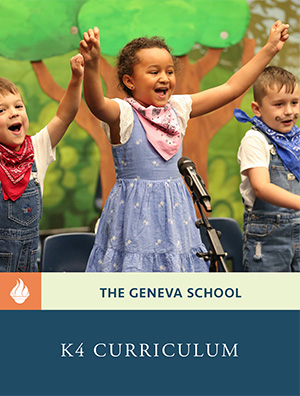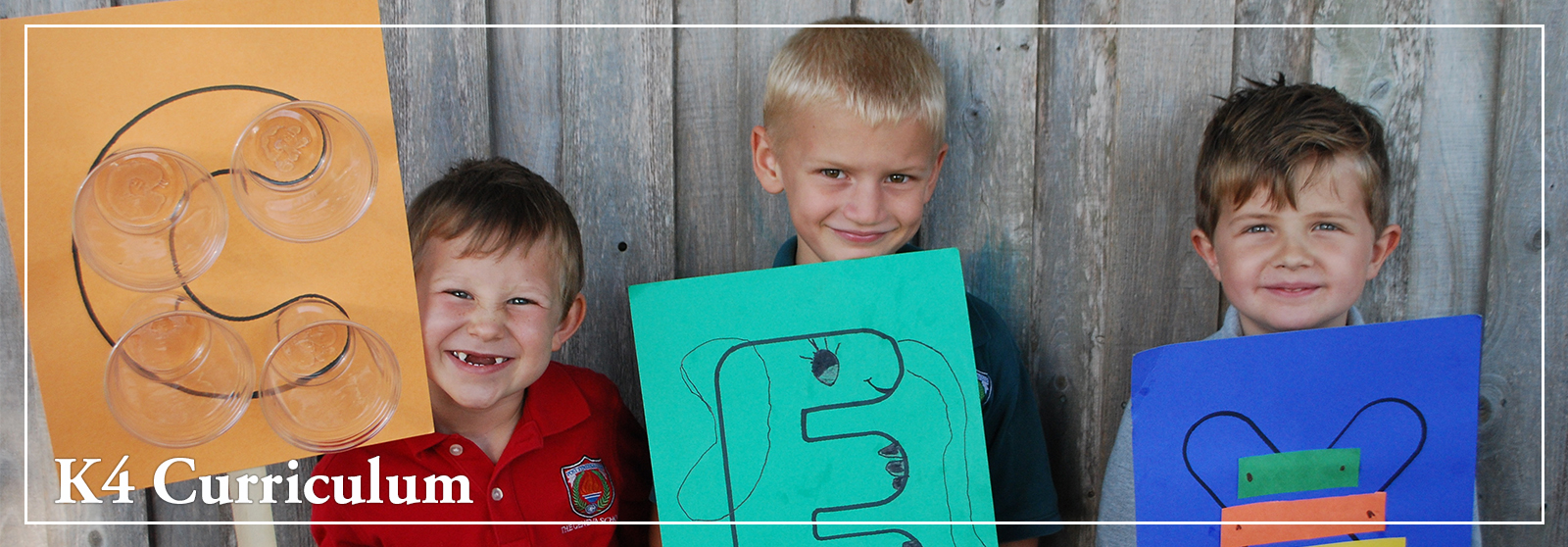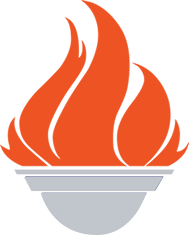K4 Curriculum

Geneva’s K4 team counts it as both a privilege and a responsibility to cultivate the mind, body, and spirit of each precious child of God in the program. This is where students take their first steps down the unique path a Christian classical education provides. Susan Wise Bauer, an educator and the author of The Well-Educated Mind, has said, “Because it uses real, living books and hands-on experimentation rather than relying on textbooks and canned presentations, classical education is a matter of exploration, of reading, thinking, and talking, and of discovery—not of rote memorization and regurgitation.” While students take this journey throughout their years at The Geneva School, K4 is where the adventure begins.
During this foundational year, teachers create a safe learning environment that allows students to take risks and discover their world through hands-on learning. The curriculum explores biblical truth and godly character, history, science and nature, literature, art, music, and so much more in a loving, safe, peaceful environment in which the children thrive and blossom.
Teachers are eager to partner with parents in fostering their child’s inquisitive mind, generous heart, and helping hands.
Integrated Curriculum
The Geneva School is committed to a theme-based curriculum that is intricately woven and integrated across all subject areas—no subject is taught in isolation. For example, K4 students study a unit on Native Americans each fall, where they learn the following concepts through multimodal means while having fun learning about real-world applications:
- Math: Students recognize and re-create the patterns, symbols, colors, and shapes unique to the Native American culture.
- Science: Students observe and discuss the process of growing corn, sprouting new plants straight from the cob. The daily life of the Wampanoag tribe is discussed and compared to the students’ daily lives.
- Language Development: Students learn to use symbols as words. They sing songs and experience stories that immerse them in Native American culture.
- Art: Students make drums, necklaces, and tunics for the Happy Harvest program that celebrates the culmination of this unit.
- History: Students learn that the teamwork and relationship between the Pilgrims and the Wampanoag tribe, along with God’s provision for us all, are the basis for our modern day celebration of Thanksgiving.
The mystery box/bag introduces language arts skills, Native American artifacts, and scientific concepts. Glyphs not only teach graphing skills but also reinforce fine motor and language arts. Art activities encourage a plethora of small-motor developments. Integrated, theme-based instruction creates both an engaging and stimulating learning environment. It also allows teachers to meet students at their developmental levels, which is crucial in early learning. The K4 curriculum places a unique emphasis on play, which creates a more successful environment and encourages the development of important social skills and friendships.
Language Arts
The K4 language arts program focuses on four major areas: phonics, writing, reading, and fine-motor development. Each week, a new letter is introduced and explored through art projects and multisensory media so that, regardless of learning style, each student can be successful. For example, wall cards provide a visual representation of the letter of the week. Students practice an auditory chant that reinforces letter sounds. A kinesthetic motion is also introduced; teachers recognize that body movement connected to learning engages the brain in a powerful way that promotes students’ neural pathway development for short- and long-term memory of new information. As the year progresses, students focus on more complex concepts, including how letters and their sounds fit into words and how words create sentences. Included is a listing of the breakdown of techniques used to support the language arts curriculum.
- Vocabulary development
- Listening skills
- Dramatic play
- Rhyming and phonics activities
- Letter recognition
- Sound/symbolic relationship of letters
- Categorizing
Through sharing quality classic and modern literature, Geneva strives to foster the love of story. By asking open-ended questions and using other techniques, teachers help students explore elements of story and develop comprehension skills.
Sensory Education
Geneva’s K4 program focuses on equipping the whole child for a lifelong love of learning using multiple creative methods. Sensory education supports the brain’s ability to receive, interpret, and use information from the world around us. Our basic senses are hearing, taste, smell, vision, touch, and movement (vestibular system). In building these core senses, the child’s brain makes correlations from God’s amazing world. K4 encourages children to explore the world around them by fostering the benefits of sensory play.
The Benefits of Sensory Play
- Builds nerve connections in the brain
- Supports language development
- Challenges creativity while developing the imagination
- Strengthens the development of large- and fine-motor skills
- Encourages problem-solving and critical-thinking skills
- Creates neuroplasticity of the mind (builds brain formation and organization)
The K4 teachers at Geneva create classrooms full of fun and engaging sensory opportunities for each child to experiment with, such as sensory tables filled with different types of dough, harvest corn, or colored rice. Children love this hands-on experience, which changes with each new theme in the classroom. The classrooms ignite a passion to love learning with activities that spark the imagination of children to see things, touch them, and handle them throughout their lives.
Directed Drawing and Tracing
One of the elements that sets Geneva’s K4 program apart is the focus on artistic expression through language arts. Teachers use tracing as a method for exposing students to letter-specific subject matter. This powerful tool helps students gain new confidence in their hand-eye coordination and fine motor control. It is also a transition into directed drawing. Our directed drawing program is a method for introducing the foundational strokes that make up letters, numbers, and shapes, as well as providing an opportunity to support a child’s listening skills and ability to follow multi-step instructions. Students gain a new confidence in their abilities and have an outlet for expression without even realizing that they are studying geometric and language concepts.
Mathematics
Math is reinforced through a variety of methods using hands-on manipulatives, math-related literature, and unit-specific projects. Throughout the year, teachers focus on the following principles:
- Patterns and classification
- Numbers and number sense
- Measurement
- Geometry
- Graphing and data interpretation (glyphs)
Bible
In K4, students learn the love of Jesus, how God made them special, and that God has a unique plan for their lives. Character development is a yearlong theme in the K4 Bible program. Teachers strive to develop in the children a sense of wonder and awe of God’s greatness and an appreciation for his creation, as well as a love for God and others and an appreciation of how he uniquely created each one of them. This beginning understanding of our great God helps them in making personal choices and in striving to display godly behavior. This is accomplished through the following:
- Weekly Scripture memorization and application
- Exploration of simple biblical principles
- Classroom devotions and prayer time
- Teacher modeling and role play
- Interactive Bible stories and songs
It is the teachers’ hope and prayer that the students experience the love of Jesus in the classroom. They are showered with a plethora of opportunities to know God and to make him known. The teachers strive to reach the heart of every child, and they endeavor to develop in their students a unique moral compass that will stay with them as they navigate their way through life.
Science and Our World
Given the theme-based units in K4, science and studies about the world in which we live become a daily part of every student’s education. Students develop an awareness of God’s world through observation. They learn that he created the world for his children’s enjoyment and that they have a responsibility to care for his world. Through experiments and formal and informal exploration, students learn about various topics such as light, the human body, weather, and animals. The classrooms transform into an outdoor campground, an underwater world, and a snowy Arctic tundra, offering opportunities to showcase children’s artwork and provide meaningful ways to interact with the thematic units. For example, as they learn more about cold-weather climates, their own projects help shape the look and feel of the classroom, making the unit come to life. Together, the class explores the concepts of migration, hibernation, and the physiological adaptations God has uniquely designed for each of the animals that live in these climates. Combining these concepts with scientific explorations such as a blubber experiment and ice play enables students to begin to comprehend ideas such as the uniqueness of self, family, and culture, in both the past and present.
Music and Movement
In every grade in The Geneva School lower school, music study and performance are vital to developing an aesthetically rich liberal arts education. In K4, the music and movement curriculum develops expressive movement, teaching students to recognize high and low pitch, internalize a steady beat, and perform fundamental elements of music. Students begin making musical associations with features of God’s creation. Music lessons are also integrated into other areas of the K4 curriculum, such as the Happy Harvest program and the Three Piggy Opera.
Library Science
One of the goals for library time is to teach students to sit quietly while listening to a story. The stories chosen for story time complement the units being studied in the classroom each week. The librarian focuses on teaching students how to choose a book to check out, how to take care of library books, and how to return the books in a timely fashion. The students learn proper library behavior and to appreciate and value books.
Art
K4 art students get to experiment with a variety of media, including watercolor, acrylic paint, soft pastels, oil pastels, textiles, clay, ink, and many more. The goal for this young age is to expose them to some of the basic elements of art—line, shape, color, form, and texture—through each of their projects in addition to basic color theory concepts. They learn drawing skills, work on dexterity and hand-eye coordination, build visual vocabulary, and even gain knowledge about a few famous artists. Each project is thoughtfully planned out and coordinates with their classroom units. Some examples include printmaking penguins during the winter unit, making their own paper and forming papercast ocean animals during the ocean unit, and painting beautifully colored elephant batiks during the week they learn about the letter Ee.
Physical Education
Geneva’s physical education program helps K4 students begin to understand that the body is an integral part of the total human being created in the image of God and that they should value the body as a God-given gift to be used to glorify him. Students explore locomotor skills, non-locomotor skills, balance, spatial awareness, manipulative skills, body awareness, and rhythm concepts through games and play. The Geneva School hopes to instill in K4 students the ability to understand basic fitness concepts and the benefits of being physically active. The year concludes with cooperative games that help demonstrate the progress they have made both physically and relationally throughout the year.
Field Trips and Culminating Events
All of the K4 field trips and culminating experiences are intentionally designed and planned to introduce, enhance, or celebrate the skills learned and facts discussed throughout each unit of study. For example, at the end of our study of God’s underwater world, the students take part in the Seafood Dining Experience. This is a time when the student oceanographers get an opportunity to see and taste many of the edible sea creatures they have learned about.
- The Great Outdoors Camping Adventure!
- Firefighter Visit (with their trucks)
- The Tale of Peter Rabbit Play (watch first grade perform)
- Happy Harvest Program
- Christmas Party
- Pet Fair
- Seafood Dining Experience
- Alphabet Parade
- Three Piggy Opera and Cast Party
- Celebration of Learning End-of-Year Ceremony
A Day in K4
- Table Activities: Small-group, teacher-directed time focused on developing healthy work habits and proper formation of letters and numbers and strengthening fine motor and listening skills, as well as reinforcing academic concepts learned in Forum (20–30 minutes, 3 times a day)
- Morning Snack and Recess: Unstructured outdoor playtime (30 minutes a day)
Forum: Whole-group structured learning and discovery time exploring the concepts of math, language arts, science, social science, and character development (20–30 minutes, 3 times a day) - Imagination Station: Unstructured playtime (20–30 minutes, 2–3 times a day)
- Lunch and Recess: Unstructured outdoor playtime (45 minutes a day)
- Book Time: Quiet book time (10–15 minutes a day)
- LAMP Classes: Library and Art (30 minutes, once a week) / Music and PE (30 minutes, twice a week)


